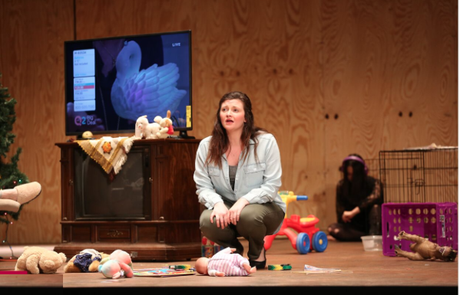by Paul J. Pelkonen

Living in her lonely world: Blair Cagney as Emmeline.
Photo by Carol Rosegg for the Manhattan School of Music.
Regardless of when it is set, Emmeline is a tragedy that Sophocles would be proud of. The source material is a New England folk story, updated into a 1980 novel by Judith Rossner. (The original libretto is by J.W. McClatchey, updated here by Mr. Strassberger.) Emmeline Mosher is just 14 when the story starts. This innocent young girl is shipped off to work at a factory in Lowell, MA. She is seduced, impregnated and abandoned by the factory foreman. The baby is delivered by her aunt. Twenty years later, she meets a younger man and falls in love with him and they happily marry. At a family funeral, her aunt pieces the story together: the couple are actually mother and son.
Mr. Picker tells this harsh tale in uncompromising musical language, using dissonant intervals and a harmonic language that sets one's hair on end. The opera uses orchestra-supported dialog to drive the story relentlessly forward, and the few opportunities for vocal display are confined to the most extreme emotional outbursts. There is no denying the power and effectiveness of this score, especially as played with gusto by the MSM students under the expert baton of George Manahan.
Although her character is up on the marquee, soprano Blair Cagney had surprisingly little to do in the first act. Emmeline doesn't get to sing much, except for her two-part seduction by Mr. Maguire (the suave baritone Jimin Park.) The vocal center here is her Aunt Hannah, played by Alanna Fraize in a barn-burning performance. The climactic scene where Emmeline gives birth is a sort of apotheosis for Aunt Hannah, rising to a great and terrible climax with a final shouted command of "Now push!"
It is in the second act where Ms. Cagney dominated the stage. We pick up Emmeline twenty years later, trapped in a miserable family life and taking care of her now disabled mother. Here, Mr. Picker writes real love music for Emmeline and her new beau Matthew, with a scene set in a gas station as a twisted and very American update of Tristan und Isolde. The big reveal (courtesy of Ms. ) comes at the midpoint of the act, and unlike some tragic treatments of Greek drama, does not stop there. We learn Emmeline's sad fate as she is first ostracized by her community and then (in a twist added by the director) medicated and committed.
Ms. Cagney sang with piercing, laser-like tone in Emmeline's difficult music, a vocal line that rises splinters and finally shatters as the truth reveals itself. With Mr. L'Esperance, she generated great dramatic intensity, especially in the stark and horrible scene where the newlyweds confront each other and it is revealed that she still loves Matthew despite him being her son. Here, Mr. Picker follows the cardinal operatic rule: the higher and louder you sing, the more likely your character is to be angry or insane. Mr. L'Esperance with his high clear tenor handled the punishing tessitura of the role with energy to spare, revealing a promising young talent.
When the audience entered the newly renovated Neidorf-Karpati Hall, they were confronted by an enormous plywood wall across the stage. This was revealed to be Mr. Strassberger's substitute for a stage curtain which was (slowly) raised and lowered throughout the action to reveal a hideous industrial set. The entire production looked (deliberately) as if it were assembled at Home Depot with much of the lighting provided by hideous vertical strips of LEDs mounted around the wooden set. This handmade approach using unattractive 21st-century industrial materials to create the harsh world of Emmeline was difficult to look at (especially with all of the LEDs is shining in the eyes of the audience) but nonetheless dramatically effective.
If you enjoyed this article, it's time to click over to Superconductor's Patreon page, and help support the cost of independent music journalism in New York City at the low cost of just $5/month.

